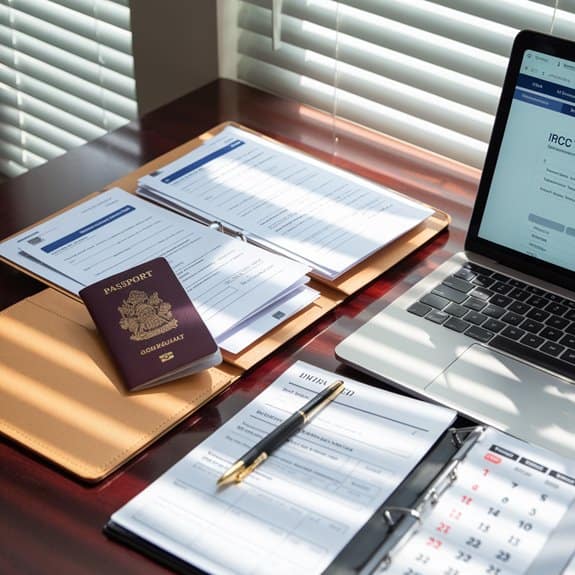
Submit your work permit renewal at least 30 days before expiration to maintain implied status and avoid disruptions. You’ll need a valid passport, current permit, job offer letter, pay stubs, and updated employment contract. If applicable, include your LMIA or exemption number. Consider applying digitally through IRCC’s online portal for faster processing and real-time updates. Understanding the specific requirements and timing will greatly increase your chances of a successful extension.
Timing Your Work Permit Extension Application Strategically
When it comes to timing your work permit extension in Canada, choosing the right moment to submit your application can greatly impact your status and employment continuity.
Strategic timing of your Canadian work permit extension is essential for maintaining legal status and uninterrupted employment eligibility.
For ideal results, you’ll want to submit your application at least 30 days before your current permit expires, though you can apply up to 180 days in advance.
If you apply before your current permit expires, you’ll benefit from implied status, which allows you to continue working under the same conditions while your application is being processed.
Don’t wait until the last minute – processing times can vary greatly, and submitting too close to your expiration date risks gaps in your work authorization.
Remember that working without valid status can lead to serious consequences, including deportation and future entry bans.
Essential Documents and Requirements Checklist
A well-organized checklist of essential documents and requirements stands as your foundation for a successful work permit renewal in Canada.
You’ll need a valid passport that won’t expire during your intended stay, along with your current work permit and a detailed job offer letter from your employer.
Don’t forget to gather proof of your legal status, recent pay stubs, and updated employment contract.
If your position requires it, you’ll also need a valid Labor Market Impact Assessment (LMIA) or LMIA exemption number.
Medical examination results and police certificates may be necessary depending on your specific circumstances.
Remember to maintain clear, high-quality copies of all documents and confirm they’re in the correct format for submission, whether you’re applying online or through the paper-based process.
Understanding Implied Status During Renewal
Building upon your document preparation, you’ll want to understand how implied status works during the renewal process.
If you submit your renewal application before your current work permit expires, you’ll automatically receive implied status, allowing you to continue working under the same conditions until a decision is made on your application.
You must maintain the exact same work conditions during implied status – this means working for the same employer in the same role.
If you leave Canada while under implied status, you won’t be able to return to work until your new permit is approved.
It’s essential to keep proof of your timely renewal application submission, as employers and border officers may request evidence of your legal status.
Common Mistakes to Avoid in Your Application
To guarantee your work permit renewal application succeeds, you’ll need to avoid several critical mistakes that commonly lead to delays or rejections.
Don’t submit incomplete documentation, as missing papers will cause immediate processing delays. Ascertain all documents are clear, legible, and properly formatted.
Ensure every required document is included and properly formatted – incomplete submissions will only delay your permit processing time.
Watch your timing carefully – applying too close to your permit’s expiration date risks gaps in your work authorization. Double-check that your passport won’t expire during your intended stay, and verify that your job offer letter contains all required details.
Avoid submitting outdated forms by downloading the latest versions from the IRCC website. If you need an LMIA, confirm it’s still valid and matches your current employment situation.
Finally, don’t forget to review your application thoroughly before submission to catch any inconsistencies or errors.
Navigating Employment Changes While Extending
While maintaining proper documentation helps prevent application issues, managing employment changes during your work permit extension requires careful attention to specific rules and timing. You’ll need to notify IRCC immediately if you’re changing employers or roles, and you can’t start your new position until you receive approval for the change.
| Situation | Required Action | Timeline |
|---|---|---|
| New Employer | Apply for a new permit | Before starting work |
| Role Change | Update current permit | Within 30 days |
| Salary Change | Notify IRCC | When change occurs |
Remember that working without proper authorization can jeopardize your status in Canada. If you’re unsure about how an employment change affects your permit, it’s best to consult with an immigration professional to guarantee you’re following the correct procedures and maintaining your legal status.
Special Considerations for Quebec Work Permits
Because Quebec maintains its own distinct immigration system, you’ll need to meet additional requirements when applying for or renewing a work permit in this province.
First, you must obtain a Quebec Certificate of Acceptance (CAQ) before proceeding with your work permit application or renewal.
Securing a Quebec Certificate of Acceptance is a mandatory first step before applying for or renewing your work permit.
To secure your CAQ, you’ll need to submit documentation including your job offer, proof of qualifications, and your employer’s Quebec business registration.
Your employer must also demonstrate they’ve made efforts to hire locally before offering you the position.
Once you receive your CAQ, you can proceed with your federal work permit application through Immigration, Refugees and Citizenship Canada (IRCC).
Remember to maintain valid status for both your CAQ and work permit throughout your employment in Quebec.
Options When Your Current Permit Is Expiring Soon
As your work permit’s expiration date approaches, several viable options can help you maintain your legal status in Canada.
You’ll want to start by applying for a renewal at least 30 days before your current permit expires, though you can submit up to 180 days in advance.
If you’ve applied for permanent residency, you might qualify for a Bridging Open Work Permit, which lets you work while awaiting your PR decision.
Alternatively, if you’re considering furthering your education, switching to a study permit could be a strategic choice.
You can also explore Provincial Nominee Programs if you meet specific regional requirements.
If these options aren’t suitable, you may need to leave Canada temporarily and submit a new work permit application from abroad.
Maintaining Legal Status Through the Process
Once you’ve submitted your work permit renewal application, maintaining legal status becomes your top priority throughout the processing period.
If you applied before your current permit expired, you’ll benefit from implied status, which allows you to continue working under the same conditions while awaiting a decision.
To protect your legal status, don’t leave Canada during processing unless absolutely necessary, as this could void your implied status.
Leaving Canada while awaiting work permit renewal can invalidate your implied status – stay in the country whenever possible.
Keep documentation of your renewal application handy, including your application number and proof of submission. If your employer asks about your status, you can show them these documents.
It’s also essential to follow all conditions of your existing permit and notify Immigration, Refugees and Citizenship Canada (IRCC) immediately if there are any changes to your employment situation.
Digital vs. Paper Application Methods
Two distinct methods exist for submitting your Canadian work permit renewal application: the digital route through the IRCC online portal and the traditional paper-based process.
The digital method offers several advantages, including faster processing times, automatic confirmation receipts, and real-time status updates through your IRCC account.
While you can still opt for the paper-based application, it’s generally slower and requires careful attention to postal regulations.
With this method, you’ll need to download and print all forms, complete them by hand or computer, and mail them with supporting documents to the appropriate processing center.
You’ll also need to include a postal money order or certified check for the processing fees, as online payment isn’t available for paper applications.
How Canadian Currents Immigration Can Help
Whether you’re facing complex immigration paperwork or seeking expert guidance, Canadian Currents Immigration can streamline your work permit renewal process. Our team of immigration lawyers, consultants, and paralegals brings decades of combined experience to help you navigate Canada’s immigration system efficiently and cost-effectively.
| Service | What We Offer | Benefits |
|---|---|---|
| Legal Expertise | Immigration law specialists | Avoid application errors |
| Document Review | Thorough assessment | Guarantee completeness |
| Application Support | Step-by-step guidance | Reduce processing delays |
| Customized Solutions | Tailored strategies | Meet specific needs |
We’ll work closely with you to understand your unique situation and develop a personalized approach for your work permit renewal. Our team stays current with immigration policies to provide accurate, up-to-date advice that maximizes your chances of success.
Frequently Asked Questions
Can I Travel Internationally While My Work Permit Renewal Is Being Processed?
You can travel while your permit renewal is processing if you applied before your current permit expired, but you’ll need proof of application and your valid permit when returning.
What Happens if My Passport Expires During My Work Permit Renewal?
You’ll need to renew your passport before completing your work permit renewal. Your work permit can’t extend beyond your passport’s expiry date, so update your passport first.
Can My Spouse Work While I’m Waiting for My Permit Renewal?
Your spouse can continue working if they have their own valid work permit. If their permit is tied to your status, they’ll need to apply for their own renewal separately.
Are Processing Times Faster for Certain Occupations or Industries?
Yes, you’ll find faster processing times for in-demand occupations like healthcare, IT, and skilled trades through the Global Talent Stream and other priority programs for critical industries.
Can I Change Provinces During My Work Permit Renewal Process?
You can change provinces during renewal, but you’ll need to update your application with the new employer and location details. Confirm your work permit allows interprovincial mobility.
Conclusion
Your successful work permit renewal depends on careful timing and thorough preparation. By starting early, gathering all required documents, and understanding your status options, you’ll navigate the process more effectively. Whether you’re applying digitally or on paper, guarantee you’ve met all requirements and avoided common pitfalls. Remember to maintain your legal status throughout and consider seeking professional guidance if you’re unsure about any steps.

We serve ALL of Canada. Currently have offices Western Canada — Vancouver, Calgary, Edmonton, Kamloops and Red Deer. We also have the infrastructure to work with any of our clients virtually — even from the furthest regions of the Yukon to Newfoundland.
Call (778) 331-1164 [toll free 1 (844) 715-0940] to get routed to the best office for you or contact us online to schedule an appointment.
We also have a dedicated intake form to help you get the ball rolling. Our intake team will review your specific case and advise you on the next steps to take as well as what to expect moving forward.
Our offices are generally open 8:30 a.m.—4:30 p.m., Mon—Fri.

Whitney Manfro
IMMIGRATION LAWYER
Whitney takes pride in her ability to swiftly negotiate fair outcomes, yet she understands the necessity of pursuing litigation to resolve certain disputes. To this end, she has served national corporations, start-ups, senior executives, and individual employees across a broad range of industries.



